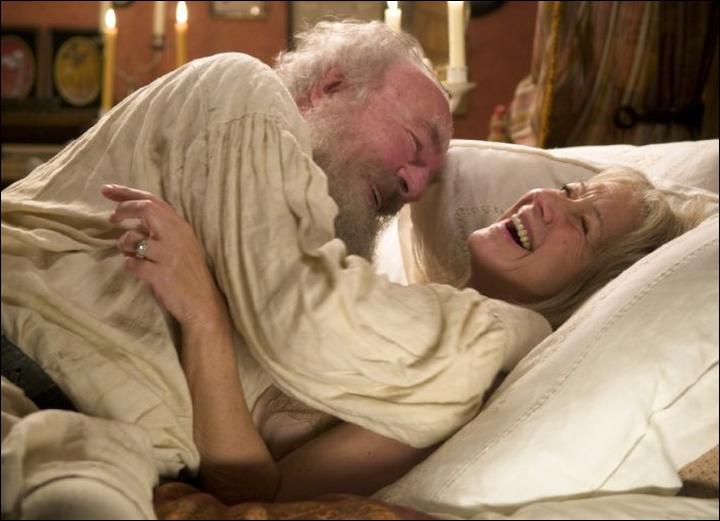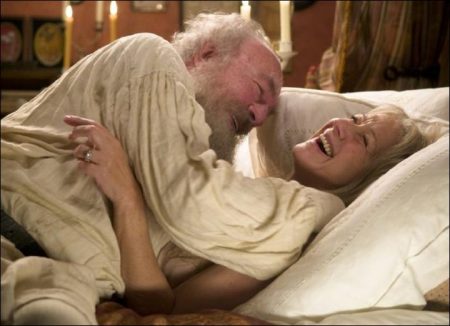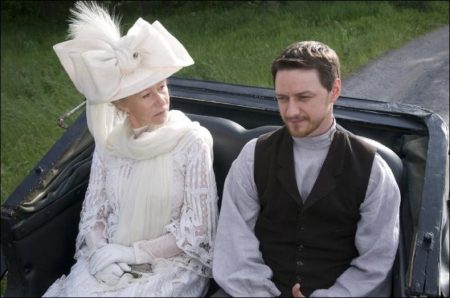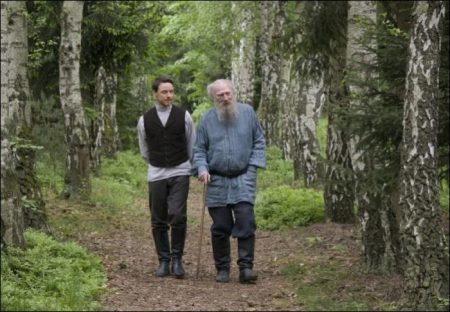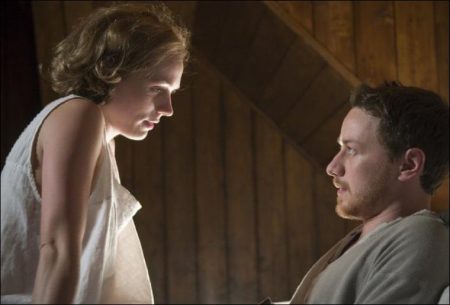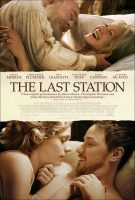Taglines: Intoxicating. Infuriating. Impossible. Love.
Countess Sofya, wife and muse to her husband Leo Tolstoy, suspects that his faithful disciple tricked him into signing a will leaving all his work and property to a Russian company. After almost fifty years of marriage, the Countess Sofya, Leo Tolstoy’s devoted wife, passionate lover, muse, and collaborator, suddenly finds her world turned upside down. In the name of his newly created religion, the great Russian novelist has renounced his noble title, his property and even his family in favor of poverty, vegetarianism and even celibacy.
Sofya is consumed by righteous outrage when she discovers that Tolstoy’s trusted disciple, Vladimir Chertkov, whom she despises, may have secretly convinced her husband to sign a new will. The document would give the rights to his works to the Russian people rather than his own family. Using every bit of cunning, every trick of seduction in her considerable arsenal, she fights fiercely for what she believes is rightfully hers.
The more extreme her behavior becomes, however, the more easily Chertkov is able to persuade Tolstoy of the damage she will do to his glorious legacy. The conflict becomes so intense, that Tolstoy, at 82 years old, the world’s biggest media celebrity, runs away from home in the middle of the night, and his wife rents a train and follows him across Russia.
Into this minefield wanders Tolstoy’s worshipful new assistant, naive Valentin Bulgakov. He becomes a pawn, first of the scheming Chertkov and then of the wounded, vengeful Sofya as each plots to undermine the others’ gains. Complicating Valentin’s life even further is the overwhelming passion he feels for Masha, a free-thinking adherent of Tolstoy’s ideals whose unconventional attitudes toward sex and love both compel and confuse him. Infatuated with Tolstoy’s notions of ideal love, but mystified by the Tolstoys’ rich and turbulent marriage, Valentin is ill-equipped to deal with the complications of love in the real world.
The Last Station is a tragi-comedy about love and marriage set during the final year in the life of the great Russian writer, Leo Tolstoy. Written and directed by Michael Hoffman (A Midsummer Night’s Dream, One Fine Day, Soapdish, Restoration), it is a true story that explores the universal themes of love, family, jealousy, betrayal, idealism, and self discovery.
Produced by Chris Curling (Zephyr Films), Jens Meurer (Egoli Tossell Film) and Bonnie Arnold, in partnership with Andrei Konchalovsky, the movie focuses on two contrasting love stories – the extraordinary relationship between Tolstoy and his wife of 48 years, the immensely passionate Sofya, and the burgeoning love between Tolstoy’s idealistic young private secretary, Valentin, and the free-thinking Masha, a teacher equally committed to the writer’s values.
Shot on location in the picturesque German regions of Sachsen-Anhalt, Saxony, Thuringia Brandenburg, the movie boasts a top-class ensemble of stars. The cast is led by Christopher Plummer (The Insider) as Tolstoy, Academy Award winner Helen Mirren (The Queen) as Sofya, James McAvoy (Atonement) as Tolstoy’s private secretary Valentin, Academy Award nominee Paul Giamatti (Sideways) as the committed Tolstoyan Chertkov, Anne-Marie Duff (The Magdalene Sisters) as the writer’s loyal daughter Sasha, and Kerry Condon (Rome) as Valentin’s beloved Masha.
Michael Hoffman begins by declaring that, “The Last Station gives us a very unusual opportunity to go beyond the standard biopic, in order to create a vivid, moving picture about the difficulty of living with love and the impossibility of living without it. It’s not a film about Tolstoy. It’s a film about the challenges of love.”
Explains producer Chris Curling. “It’s about the love of old people seen through the eyes of a young person embarking on his first love. Those are things that everyone goes through. And that’s why I think The Last Station will have universal resonance. We’ve all been there.
The Adaptation
It’s rare for authors to be pleased with adaptations of their novels, but author Jay Parini was pleased with Michael’s screenplay. “Mike has captured the inherent drama of the story. Drama is all about conflict, and the last year of Tolstoy’s life was one conflict after another. You can’t beat the conflict between Sofya and Chertkov. They are like night and day, and their battle mirrors Tolstoy’s own psychological split. What is great is that Mike’s script deeply understands that The Last Station is all about psychological strife and the endless fight of the spiritual versus the material.”
Actress Helen Mirren was magnetized by the grand passion conjured by the screenplay. “Michael has written a superb script and he’s making a marvelous film. You don’t often get to read wonderful scripts and this really is a wonderful script.
Producer Chris Curling says, “The most important thing Mike did was place Valentin at the centre of the movie. That liberated him as a writer to create a compelling human drama rather than a straight biopic. The film has to hook the 99 per cent of the audience who haven’t read Anna Karenina or War and Peace and won’t know who on earth Tolstoy is. But they will still be gripped by the emotions Mike conjures up in The Last Station.”
Michael adds that in writing The Last Station, he felt it was crucial to mingle the tones and interweave comedy and tragedy. “Before writing the screenplay, I went back and re-read all of Chekhov’s major plays. Chekhov is one of my favourite writers, and I’m very grateful to him because he helped me understand the tone. I wanted to write a tragic-comedy about marriage; I wanted to create a story where tragedy and comedy live really close to each other.”
Love and Marriage
“It’s a great story about relationships and a wonderful juxtaposition of old love and new love.” Michael continues, “The core of the movie is this battle between idealism and reality. All of us start life with an idea of what love should be, which contrasts sharply with the reality of love in the real world. Tolstoy was seen as a living saint. He is revered as the ultimate authority on love, but he can’t sort things out in his own living room and bedroom. This is a fascinating problem.”
“The Last Station is the story of two love affairs,” says producer Chris Curling. “Tolstoy and Sofya are an old couple who have obviously had the most incredible life together. They have been working partners and had thirteen children together. And yet they’ve got to a stage where their politics are so different that despite the magnetic attraction between them, they can’t live with each other.
Sofya had given her life to Tolstoy’s work,” explains Helen Mirren. “She copied War and Peace out six times – think of the work! She was very much involved in all his work, so the novels belonged to her, too. Nowadays in a similar situation where a couple get divorced and the wife has been supportive throughout the marriage, by law the husband has to give her half of what he owns because she’s helped him achieve that. It’s exactly the same with Sofya and Tolstoy. She is simply fighting for what she is owed.”
“Valentin enters their story infatuated with the ideal of fleshless, spiritual love. He gradually realizes that all we can hope for is the messiness of love in the real world,” reveals Michael. “It’s intensely moving to watch the Tolstoys’ love through the eyes of Valentin, who is himself falling in love for the first time and realizing there is more to life than idealism and politics,” remarks Chris. “He comes to see that the only way you can make love work is by entering into it wholeheartedly. He is witnessing the perils of relationships played out by Tolstoy and Sofya, and through him we can feel their pain.”
“He sees that there is great turmoil in his mentor’s life and huge discord with his wife, and yet all Tolstoy’s work is about the supremacy of love,” explains James McAvoy. “Valentin finds it very hard to reconcile the two. The inconsistencies make it difficult for Valentin to follow this idealized image he had built up in his head.”
The other main strand in Valentin’s story is his tortuous love affair with Masha. “In many ways, the film is about the impossibility of love,” says James. “He’s initially drawn to Masha for the same reason he’s drawn to Tolstoy: the ability to cut through all the nonsense in life. Valentin and Masha share this great passion for Tolstoy’s ideals and for each other. But all sorts of obstacles are put in the way of their love.
The film is strong on the theme of sexual politics. “It’s one of the things that make The Last Station seem very modern,” says producer Bonnie Arnold, “In public, Tolstoy was revered. He was the first real media celebrity, and yet one on one, Tolstoy and Soyfa were absolute equals. She said, `you’re not only a writer – you’re a husband and father, too.’ That was very bold of her.”
“The film is all about love – young love and old love,” explains Helen. “It shows the practicalities and the disasters that love can involve. I have a few favourite lines as Sofya. At one point, for example, Tolstoy says to her, `why do you have to make it so difficult?’, and she replies, `why should it be easy? I’m the work of your life and you’re the work of mine – that’s what love is.’ That’s a great line.”
The Last Station (2010)
Directed by: Michael Hoffman
Starring: James McAvoy, Christopher Plummer, Helen Mirren, Paul Giamatti, Anne-Marie Duff, Kerry Condon, Tomas Spencer, Wolfgang Häntsch, David Masterson, Patrick Kennedy, Anastasia Tolstoy
Screenplay by: Michael Hoffman
Production Design by: Patrizia von Brandenstein
Cinematography by: Sebastian Edschmid
Film Editing by: Patricia Rommel
Costume Design by: Monika Jacobs
Set Decoration by: Mark Rosinski
Art Direction by: Andreas Olshausen, Erwin Prib
Music by: Sergei Yevtushenko
MPAA Rating: R for a scene of sexuality / nudity.
Distributed by: Sony Pictures Classics
Release Date: January 15, 2010
